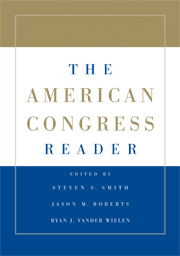Book contents
- Frontmatter
- Contents
- THE AMERICAN CONGRESS READER
- PART I THE AMERICAN CONGRESS: MODERN TRENDS
- PART II REPRESENTATION AND LAWMAKING IN CONGRESS: THE CONSTITUTIONAL AND HISTORICAL CONTEXT
- PART III CONGRESSIONAL ELECTIONS AND POLICY ALIGNMENTS
- PART IV MEMBERS, GOALS, RESOURCES, AND STRATEGIES
- PART V PARTIES AND LEADERS
- PART VI THE STANDING COMMITTEES
- PART VII THE RULES OF THE LEGISLATIVE GAME
- PART VIII THE FLOOR AND VOTING
- PART IX CONGRESS AND THE PRESIDENT
- PART X CONGRESS AND THE COURTS
- PART XI CONGRESS, LOBBYISTS, AND INTEREST GROUPS
- PART XII CONGRESS AND BUDGET POLITICS
- PART XIII FURTHER READINGS ON CONGRESSIONAL POLITICS
- 40 Introduction to the Spatial Theory of Legislating
- 41 The Institutional Foundations of Committee Power
- References
41 - The Institutional Foundations of Committee Power
Published online by Cambridge University Press: 05 June 2012
- Frontmatter
- Contents
- THE AMERICAN CONGRESS READER
- PART I THE AMERICAN CONGRESS: MODERN TRENDS
- PART II REPRESENTATION AND LAWMAKING IN CONGRESS: THE CONSTITUTIONAL AND HISTORICAL CONTEXT
- PART III CONGRESSIONAL ELECTIONS AND POLICY ALIGNMENTS
- PART IV MEMBERS, GOALS, RESOURCES, AND STRATEGIES
- PART V PARTIES AND LEADERS
- PART VI THE STANDING COMMITTEES
- PART VII THE RULES OF THE LEGISLATIVE GAME
- PART VIII THE FLOOR AND VOTING
- PART IX CONGRESS AND THE PRESIDENT
- PART X CONGRESS AND THE COURTS
- PART XI CONGRESS, LOBBYISTS, AND INTEREST GROUPS
- PART XII CONGRESS AND BUDGET POLITICS
- PART XIII FURTHER READINGS ON CONGRESSIONAL POLITICS
- 40 Introduction to the Spatial Theory of Legislating
- 41 The Institutional Foundations of Committee Power
- References
Summary
Using spatial theory, Shepsle and Weingast argue that the power of congressional standing committees rests on their domination of conference committees. Members of the committees originating legislation dominate conference committee delegations and know that the parent houses must approve or disapprove of conference reports without amendment. This system gives committee members an opportunity to overturn changes in committee bills that were approved on the floor and creates a disincentive for legislators to offer amendments to committee bills in the first place. This conference power is called an ex post veto because it follows floor action.
Legislative committees have fascinated scholars and reformers for more than a century. Differences of opinion concerning the role of committees persist, but there is a substantial consensus on a number of stylized facts:
Committees are “gatekeepers” in their respective jurisdictions.
Committees are repositories of policy expertise.
Committees are policy incubators.
Committees possess disproportionate control over the agenda in their policy domains.
Committees are deferred to, and that deference is reciprocated.
There is, however, a troublesome quality to this consensus. The items in this list (and there could undoubtedly be more) describe or label committee power, but they do not explain it. Explanations of these empirical regularities require a theory. In the case of each of these stylized facts, that is, a theory is needed to determine why things are done this way.
- Type
- Chapter
- Information
- The American Congress Reader , pp. 449 - 459Publisher: Cambridge University PressPrint publication year: 2008
References
- 1
- Cited by



